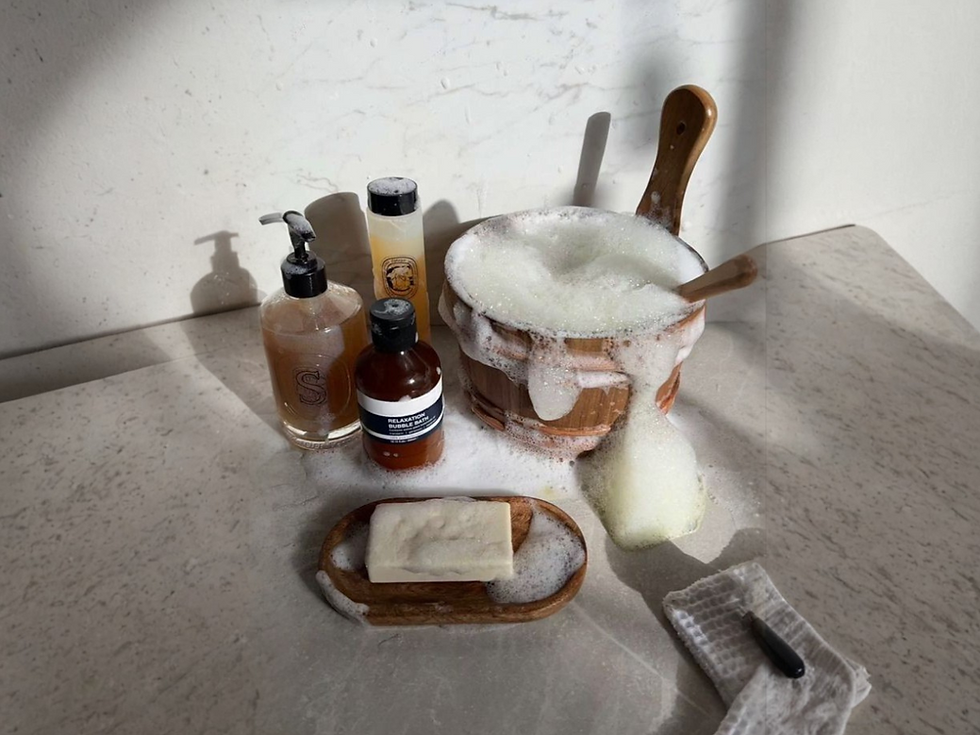The Dirty Side of “Clean” Apps: Which Clean Product Scanners You Can Trust
- jennysmithmattfeldt

- Sep 23, 2025
- 4 min read
Updated: Sep 25, 2025
Which product scanners to trust, which to skip, and how to find products that actually support your health.
By Jenny Smith Mattfeldt | Published September 23, 2025

The lack of transparency with personal products these days is insane. It's bad enough that so many products we rely on are loaded with hormone disruptors that mess with your skin, gut, cycles (you name it) but now so many are marketed as if they’re the cleanest you can find. Brands know “clean” sells, so they slap it on the label whether it deserves to be there or not.
I got nostalgic a few weeks ago and grabbed a hair texturizing spray I loved in high school (you might recognize that toasted coconut smell.) Cute, right? Except now I’m breaking out along my temples and jaw terribly, everywhere my hair was touching my face. Lesson learned, we know better than this but it's so hard to know which products aren't going to negatively affect us but will actually work.
If you haven't used them before, clean product scanners are apps that you can use to look up or scan the barcode on your product to see how safe the product is. Most rate items based on ingredient safety, potential allergens and irritants, environmental impact, transparency in labeling, unnecessary additives, and (for food-focused apps) nutritional quality. So here we go: the most accurate, most trustworthy apps to figure out what’s actually in you products and to help us all find better swaps when it’s time for a refill.
Apps I recommend (free & generally independent)
EWG Healthy Living — barcode scanner + EWG science-backed ratings for cosmetics, cleaning products and food; run by the nonprofit Environmental Working Group (so not pharma-owned). Great if you want ingredient hazard context and sources.
INCIdecoder — focuses on decoding ingredient lists (science-forward, written by a cosmetic formulator). No flashy score system; extremely thorough for understanding what each ingredient actually does. Free web + app.
SkinSort — independent skincare scanner and discovery site that emphasizes being unbiased (they state they’ve stayed independent). Good UI for filtering by concern/ingredient. Free/basic app.
Clearya — newer free tool (browser extension + mobile) that flags potentially toxic ingredients while you shop online (Amazon, Target, Sephora, Walmart). Independent startup founded by technologists. Useful for shopping-time alerts.
Yuka — very popular barcode scanner (food + cosmetics). Independent French team, free core features (paid tier optional). Clear, simple scoring and alternative suggestions. Good for quick in-store bar code scans.
SkinSAFE — built in partnership with Mayo Clinic; geared toward people with allergies/sensitivities (you can filter by allergens). Not pharma-owned; useful if you need allergy-specific screening.

Quick tips for getting the most out of them
• Use more than one app — their scoring methods and ingredient priorities differ, so cross-check.
• Remember: no app is perfect. Treat these as transparency tools, not final medical advice.
• If you have serious health concerns (pregnancy, cancer history, strong allergies), pair app info with a clinician or board-certified dermatologist.
Apps to approach with caution
Here’s the kicker: just like so many products get greenwashed and marketed as “clean” when they’re anything but, there are also apps out there claiming to give you honest, science-backed scores—while actually being owned by big pharma or companies like Procter & Gamble (and surprise, surprise… their own products magically get top ratings). Here are a few you’ll want to skip.
Think Dirty — ironically the OG app in this space and the first one I ever used. They were bought by P&G Ventures back in 2021, which raised red flags since P&G makes a ton of the very products being rated. The trust factor really dropped after that.
GoodGuide — once a decent barcode scanner, but it shut down after being acquired years ago (by Underwriters Laboratories, which has corporate ties). If you still see it floating around, skip — it’s outdated and unsupported.
CosmEthics — started strong as an EU-based ingredient checker, but user reports say the database is outdated and the company shifted toward brand partnerships (pay-to-play product placement).
CodeCheck — German app that blends food + cosmetics scanning. Not pharma-owned, but it’s been criticized for inconsistent ratings and accepting brand partnerships, which muddies neutrality.
EWG copycats — you’ll see random “EWG Skin Deep lookalikes” in app stores. Many scrape the EWG database without permission, slap ads everywhere, and don’t update. They’re unreliable.

Red flags to spot in any new app
Heavy ads or “sponsored” top results.
Lack of transparency on scoring (if you can’t find methodology, skip).
“Promoted clean brands” sections that look like ads but aren’t labeled.
No clear nonprofit or independent ownership structure.
You shouldn’t need a PhD in chemistry just to buy clean shampoo. These apps won’t fix the beauty industry overnight, but they will put the power back in your hands and that’s a game changer. Scan first, buy later, and watch how much easier it gets to dodge greenwashing and actually protect your skin, hormones, and sanity.
Now I’m dying to know: what products are you scanning? Which classics shocked you with horrible ratings? And what hidden gems are you loving? Drop them below, and make sure you join the Chaotic Wellness Club newsletter so you don’t miss a single update—we’re in this mess together.





Comments